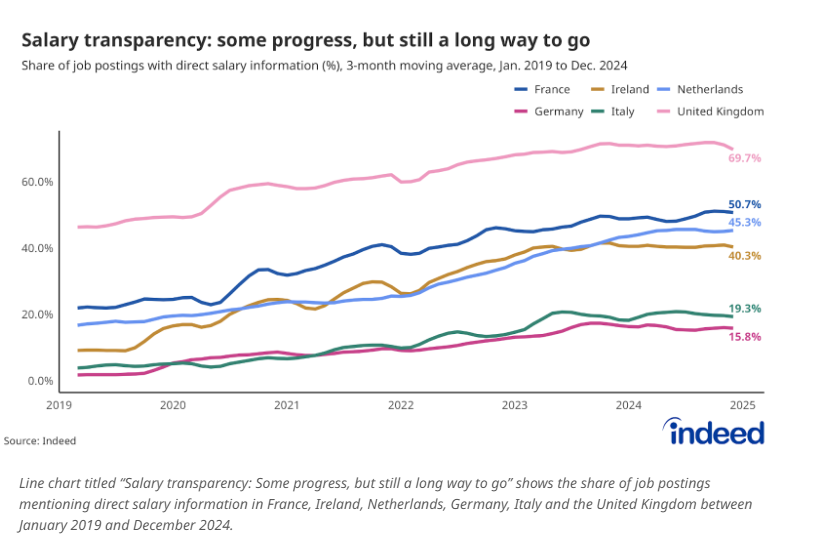Indeed: 1 in 3 employees have no salary transparency at work
UNLEASH dug into Indeed’s new European data, and explored with Senior Economist Jack Kennedy how and why HR leaders must step up.
News In Brief
Salary transparency is top of the European agenda in 2025.
Indeed's latest data explores how different countries rank, and areas for improvement across the board if organizations are to reap the trust, retention and legal benefits of transparency around pay.
UNLEASH unpicked the data with the help of Indeed Senior Economist Jack Kennedy.
The UK is very far ahead of other European markets when it comes to salary transparency.
That’s according to new data from Indeed.
Seven in ten job listings on Indeed in the UK include details about pay, compared to 50% in France, 45% in Netherlands, 41% in Ireland, and just 20% in Italy and 16% in Germany.

These findings are a concern as the European Union’s Pay Transparency Directive has passed and comes into effect in 2026. This regulatory change has less direct impact on UK businesses, so it is noteworthy that they are ahead of the game on salary transparency.
Another issue identified by Indeed is that while employers are making some progress around pay transparency when it comes to job listings, they aren’t doing so well when it comes to the workplace itself.
Indeed also surveyed 6,000 European employees and found that 31% have no salary transparency at work, and 37% only have partial transparency (like salary brackets). Just 28% report having full pay transparency in their jobs.
This is despite 61% employees being on board with transparency around salary ranges and benefits.
54% want to know more clarity about annual leave, while 48% want more information about bonuses and 38% want transparency around healthcare, according to Indeed’s survey.
‘Greater transparency in salaries benefits everyone’
It is clear that organizations need to step up to ensure that they are meeting employees’ expectations, as well as reaping the wider business rewards of salary transparency.
Speaking exclusively to UNLEASH, Indeed’s Senior Economist Jack Kennedy shares: “The fact is, greater transparency in salaries benefits everyone, helping people make informed decisions about their careers and ultimately leading to better work.”
He continued: “The tide is starting to turn, with many businesses understanding that providing clear pay information up front is key to attracting talent and building trust with both new and existing staff.”
In a blog post, Indeed Labor Economist Lisa Feist added some context to this statement, sharing: “Providing clear and upfront information on salaries has a range of benefits for employers: It can streamline the hiring process by reducing time spent on wage negotiations and can help attract a broader candidate pool, particularly in competitive labor markets.
“Additionally, salary transparency can foster trust, strengthen employer branding, and enable businesses to address pay disparities proactively, helping mitigate legal and reputational risks.”
On the trust point, recent PayFit data shared exclusively with UNLEASH found a direct link between salary and trust.
62% of the 1,500 employees surveyed in the UK, France and Spain said that pay transparency increased their satisfaction, with 65% saying it would improve trust.
“For employees and jobseekers alike, knowing market-aligned salary ranges sets realistic expectations, empowers negotiation, and mitigates information asymmetry between employers and candidates,” continued Indeed’s blog.
“This, in turn, promotes fairer labor market outcomes and can enhance job satisfaction and retention.”
Sign up to the UNLEASH Newsletter
Get the Editor’s picks of the week delivered straight to your inbox!

Chief Reporter
Allie is an award-winning business journalist and can be reached at alexandra@unleash.ai.
-
Topics
Compensation and Benefits